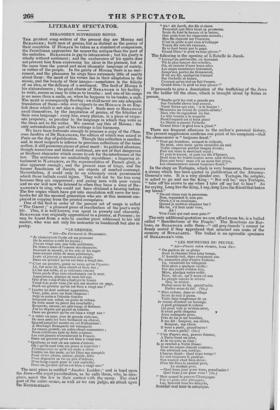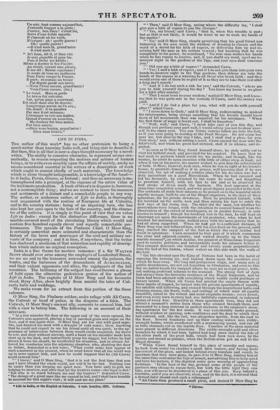BERANGER'S SUPPRESSED SONGS.
LITERARY SPECTATOR.
THE greatest song-writers of the present day are MooRE and BERANGER ; both men of genius, but as distinct as the genius of their countries. If HORACE be taken as a standard of comparison, the Frenchman approaches far nearer the antique than the poet of the melodies. BERANGER is gay to intoxication ; but his gaiety is wholly without sentiment ; and the exuberance of his spirits does not prevent him from expressing his ideas in the plainest, but at the same time the purest and most idiomatic language of society, or rather of the people. In the gaiety of MooRE there is no mer- riment, and the pleasures he sings have extremely little of reality about them : the merit of his verses lies in their adaptation to the music, and the beauty of their images—sometimes in the felicity of an idea, or the delicacy of a sentiment. The fault of MooRE is his elaborateness ; the great charm of BERANGER is his facility : to write, seems as easy to him as to breathe ; and one of his songs is no more than a smile, or, when he happens to be tender, a sigh. The merit is consequently fleeting: we shall never see any adequate translation of them—who ever expects to see HoHacE in an Eng- lish dress which is not also a disguise ? Such men as BERANGER avail themselves, by the inspiration of genius, of the felicities of their own language : every line, every phrase, is a piece of exqui- site propriety, as peculiar to the language in which they write as the ideas are to the writer. We cannot say this of Moons : the only untransferable part of his writings is his harmony. We have been fortunate enough to procure a copy of the Chan- sons Inedites of De BERANGER, the edition of which was seized in Paris on the day of publication. Though this collection is smaller, and in most respects is inferior to previous collections of the same author, it still possesses pieces of great merit : its political allusions, though numerous and indeed continual, are not of that dangerous or libellous character which seems to ask for the interference of the law. The sentiments are undoubtedly republican : a lingering at- tachment to NAPOLEON, as the representative of French glory, is also apparent enough ; and the present race of kings, and the former fanaticism of Jesuits, are objects of marked contempt. Nevertheless, it could only be an extremely weak government which these ballads could injure. They will not be the less sung because they are suppressed; and young men with poor voices and no ear will now be listened to when they have a song of BE- RANGER'S to sing, who could not have obtained a hearing before. The few copies which have got into circulation will serve for text- books for all the musical generation who are at this moment em- ployed in copying from the printed exemplaire. One of the first in order of the present set of songs is called " The Garret ;" a pleasant piece of recollection of the poet's early life. This, it is well known, was spent in poverty and obscurity. BERANGER was originally apprenticed to a printer, at Peronne ; as may be learnt from a note to another piece addressed to his old master, who was not only his instructor in handicraft but also in poetry.
"LE GRENIER.
"Air—Du Carnaval de Mussonnier.
"Je vicnsrcvoir i'asile oil ma jeunesse De la misere a subi les lecons ; J'avais vingt ans, une folle maitresse, De francs amis et l'amour des chansons. Bravant le monde, et les sots et les sages Sans avenir riche de mon printemps, Leste et joyeux je montais six etages. Dans un grenier qu'on est bien a vingt ans.
" C'est un grenier, point ne veux qu'on ]'ignore. Lit, fut mon lit, bien chetif et bien dur ; I.a fut ma table, et je retrouve encore Trois pieds d'un vers charbonnes sur le mur.
Apparaissez, plaisirs de mon bel age, Que d'un coup d'aile a fustiger le temps Vingt fois pour vous j'ai mis ma montre en gage, Dans un grenier qu'on est bien a vingt ans !
Lisette ici doit surtout apparaitre, Vive, jolie, avec un frais chapeau : Deja sa main a retroite fenetre Suspend son schal, en guise de rideau. Sa robe aussi va parer ma couchette ; Respecte, amour, ses plis longs et flottans. J'ai su depuis qui payait sa toilette. Dans un grenier qu'on est bien a vingt ans !
"A table un jour, jour de grande richesse, De mes amis les voix brillaient en chceur, Quand jusqu'ici monte un cri d'allegresse : A Marengo Bonaparte est vainqueur Le canon gronde, un autre chant commence ; Nous celebrons tant de faits cclatans. Les rois jamais n'envahiront la France. Dans un grenier qu'on est hien a vingt ans. Quittons ce toit oft ma raison s'enivre. Oh ! qu'ils sont loin ces jours si regrettes ! rechangerais ce qu'il me reste a vivre Contre un des mois, qu'ici Dieu ma comptes Pour rover gloire, amour, plaisir, folic Pour depenser sa vie en pea d'instans, D'un long espoir pour la voir embellie. Dans un grenier qu'on est bien a vingt ans."
The next piece is entitled "Jacob's Ladder;" and is hard upon the Jews—the royal pawnbrokers, as he calls them, who, he ima- gines, assist the few in their contest with the many. The chief part of the satire seems, as well as we can judge, an attack upon the ROVISCHILDS.
ft
"Ah ! dit Jacob, des fils si oilers Prouvent quo Dieu tient sa promesse. Seuls Us font la hausse et la baisse, Ont seals tous les emprunts ouverts; Mes fils regnent sur l'univers, C'est la peste a qui rien n'echappe Voyez dix rois les caresser, Its se font benir par le pape.
Grand Dieu I le pied va leur glisser."
The following is the opening of L'Echelle de Jacob.
" Lorsqu'un patriarche, en dormant Vit la plus longue des echelles, Oil, de crainte d'user leurs ailes Les anges montaient lestement, Jusqu'aux portes du firmament, 11 vit ses fils, quelqu'un ]'assure Sur l'echelle se hisser, Croyant qu'au ciel on fait l'usure.
Grand Dieu I le pied va leur glisser I" It proCeeds to give a description of the trafficking of the Jews on the ladder till the close, which is brought about by Satan in person.
" Tandis qu'il les voit a ;rands pas Sur l'echelle Clever leur course, Vient Satan qui crie, A la bourse ! `Messieurs on craint de grands debats.'. Bien vite Hs regardent en bas. La tete tourne a la sequelle Dont l'orgueil est si haut place Le Diable a secoud rechelle. Grand Dieu! le pied leur a glissd."
There are frequent allusions to the author's personal history. The present suppression confirms one point of his complaint—that the chansonnier is" toujours fesse."
" Tout gai frondeur, semant le ridicule, Ne peut, ches nous qu'en recueillir du mal. Notre empereur portait longue ferule ; Puis est venu le martinet royal P • Ft puis le knout, et puis les fils d'Ignace, Dont tous les fouets contre nous sont dresses. Dieu soit beni ! mais s'il ne nous fait grace, Les chansonniers seront toujours fesses."
In the elegy on Turlupin, which is very humorous, there occurs a stanza which has been quoted in justification of the Attorney- General's veto. It is a very slender one. Turlupin, the cobpler, is asked to go and see the King : " But will he," says Turlupin, " take off his crown to me when I take off my hat to him ? As for crying, Long live the King, I say, long Live the friend that bakes my bread."
"Du roi viens voir la personne. Non, repondait ii, non pas. Otera-t-il sa couronne, Quand je mettrai chapeau bas ? Ma foi, s'il faut crier vive, Ah !
Vive l'ami qui cuit mon pain 1"
The only additional quotation we can afford room for, is a ballad called " Recollections of the People." The Bourbons (or Bar- bons, as BERANGER calls them—" old grey-beards") cannot be firmly seated if they apprehend that mischief can come of the memory of BONAPARTE. The ballad is an agreeable specimen of BERANGER'S vein.
" LES SOUVENIRS DU PEUPLE.
"Air—Passe: votre chemin, beau Sire.
" On parlera de sa gloire
Sous le chaume bien long temps, L' humble toit, dans cinquante ans Ne connaitra plus d'autre histoire. La, viendront les villageois Dire alors a quelque vieille : Par des recits d'autre fois, Mere, abregez notre veille.
Bien, dit on, qu'il nous ait nui Le peuple encore le revere Oui, le revere.
Parlez-nous de lui, .grand'mere
Parlez-nous de lui. (Us)
" Mais enfans, dans ce village Suivi de rois ii passa. Voila bien longtemps de qa Je venais d'entrer en menage.
A pied grimpant le coteau Ou pour voir je m'etais raise,
Ii avait petit chapeau
Avec redingote grise.
Pros de lui je me troublai, 11 me dit : bonjour, ma there, Bonjour, ma there. 11 vous a parle, grand'mere !
II vous a parle ! (his.)
" L'an d'apres moi,. pauvre femme, AParis etant un jour, Je le vis avec sa cour ; Is se rendait a Notre Dame.
Tous les cceurs etaient contens ; On admirait son cortege. Chacun disait : Quel beau temps !
Le ciel toujours le protege.
Son sourire etait bien dour: D'un fils Dieu le rendait pere, Le rendait pere.
—Quel beau jour pour vous, grand'mere
Quel beau jour pour vous ! (his.)
" Mais quand la pauvre Champagne Fut en proic aux grangers, Lui, bravant tous les dangers,
Sembluit seul tenir A campagne.
7
Un soir, tout comme aujourd'hui,
J'entends frapper a la porte; J'ouvre, bon Dieu! c'etait lui, Suivi d'une foible escorte.
Il s'asseoit oil me voilh, S't.criant : oh ! quelle guerre !
Oh ! quefle guerre ! —11 s'est assis hi, grand'imiire 11 s'est assis la.
" Ja'i faim, dit ii, et bien vite Je sers piquette et pain his. Puis it seche sea habits ; BOme d dormir le feu l'invite.
Au reveil, voyant mes pleurs,
II me dit : Bonne esperance
Je cours de tous ses malhcurs Sous Paris venger la France. 11 part ; et comme un tresor J'ai depuis garde son verre. —Vous l'avez encore, grand'mere
Vous l'avez encore. (bis.)
" Le-voici. Mais sa perte Le heros fut entralne.
Lui, qu'un pape a couronne, Est mort dans une ile dcserte.
Long temps aucun ne l'a cru ; On disait : it va paraitre Par mer it est accouru; L'etranger va voir son maitre. Quand d'erreur on nous tira, Ma douleur fut Bien amere.
Fut bieu aniZTe.
—Dieu vous benira, grand'm&e ! Dieu vous benira."



















 Previous page
Previous page